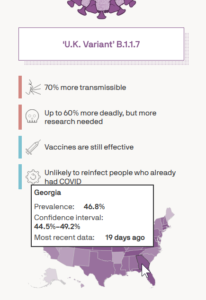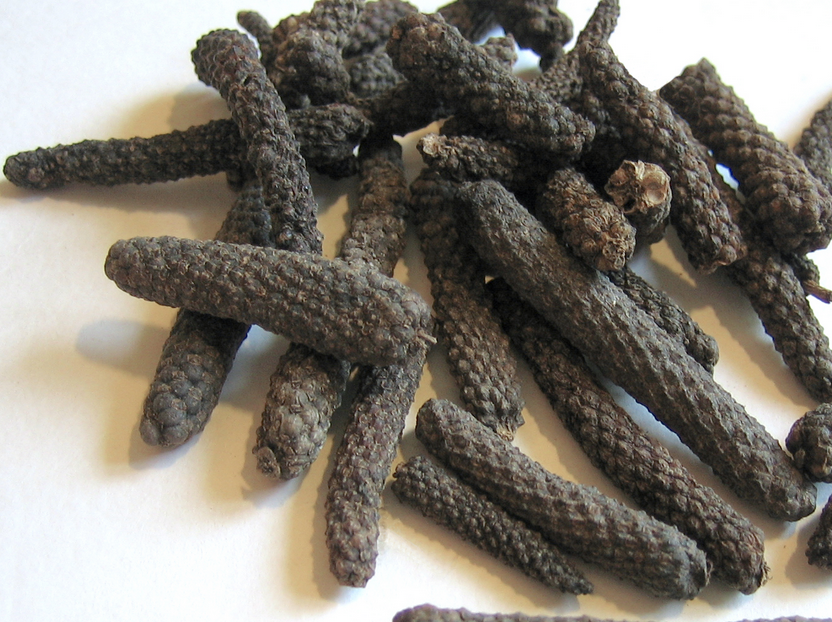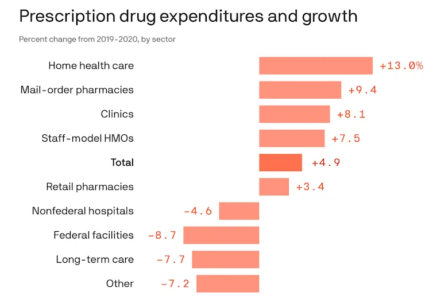Fungus for life, then 99.2% solution, cooking without flavor, and more
23 Apr 2021
Posted by Andrew Kantor
Do you need a mask outdoors?
If you’re just walking around, nope. If you’re in close conversation and not everyone is vaccinated, probably.
“Viral particles quickly disperse in outdoor air, and the risk of inhaling aerosolized virus from a jogger or passers-by are negligible.”
Here’s the “rule”: Outdoors, distanced, masked — meet any two.
No rest for the wicked
Poor Teresa (Tatum, that is, GPhA’s director of education) — every time she opens another immunization course* it sells out. So she’s scheduled yet another to try to quench the undying demand.
Now available: Sunday, May 23 from 8:00 a.m. – 5:00 p.m. at the GPhA North American Headquarters facility in Sandy Springs [map]. Click here to register.
If you weren’t able to sign up for one of the others, now’s your chance. (Want more info? Get it at GPhA.org/immunization-2021.)
And techs, don’t feel left out!
Teresa’s also added a tech immunization course: Saturday, May 22: Info and signup at GPhA.org/pharmacy-tech-immunization-delivery-training.
* APhA’s Pharmacy-Based Immunization Delivery: A Certificate Program for Pharmacists
The variants came down to Georgia
Axios has a pretty chart of all the Covid variants, which ones are where, and whether to worry.

Eat more fungus?
Fungus isn’t just something that grows between your toes — if you eat it (say Penn State researchers), you might have a lower risk of cancer.
How so? The conclusion is based on a review of 17 cancer studies and more than 19,500 patients from 1966 to 2020.
According to the findings, individuals who ate 18 grams of mushrooms — about 1/8 to 1/4 cup — daily had a 45% lower risk of cancer compared to those who did not eat mushrooms.
Why? Probably, they figure, because of ergothioneine, a “unique and potent antioxidant and cellular protector” found in most mushrooms.
Covid creep
Georgia hospitals are worried. They aren’t seeing another surge in Covid-19 patients, but they are seeing “a worrisome creep upward” in admissions — sometimes for people who are reinfected (likely, but not necessarily, from a variant).
(Shout-out to Wellstar’s Danny Branstette, the health system’s presumably exhausted director of medical infection prevention, who is featured in the story.)
Eat a pepper, too
This comes from UPenn, where pharmacologists have figured out how an ingredient in the Indian Long Pepper — aka, the plant we get good ’ol black pepper from — can shrink glioblastomas.
Piperlongumine (that’s the ingredient) “binds to — and hinders the activity of — a protein called TRPV2, which is overexpressed in glioblastoma in a way that appears to drive cancer progression.”
Knowing how that works can help them in “bringing our findings from bench to bedside.”
Next up: preclinical trials.

I never knew what they looked it. Neat.
Breaking through … kinda
Don’t forget the vaccine mantra: “96 percent is not 100 percent.” Yes, there will be “breakthrough” infections. But so far not too many.
Of the 75 million or so Americans who have been fully vaccinated so far, the CDC has received 5,814 reports of vaccine breakthrough. That’s (scribble scribble) 0.0078%. In other words, current data says the vaccine is 99.2% effective.
But wait, there’s even more: “Most of those have been mildly symptomatic or asymptomatic.”
Almost a third of the breakthrough infections reported to the CDC were asymptomatic. Only 396 people were hospitalized, and a third of that group was in the hospital for a reason other than COVID-19 — that is, the disease was not the reason they were seriously ill, they just happened to also test positive for the virus.
Drug spending ups and down
The pandemic (you might have heard about it) has done wacky things to prescription drug spending. Overall it’s up — not surprising, really — but not across the board. Home health care saw the biggest increase, while long-term care facilities saw a significant drop. (Retail pharmacies are up a bit, in case you were wondering.)
This comes from the American Society of Health-System Pharmacists (“Pharmacists Advancing Healthcare”), which just released a report on that shift.

In case you missed it the first three times
Yet Another Poll finds that people stock up on old meds ‘just in case,’ rather that disposing of them (at, say, Saturday’s National Prescription Drug Take Back Day).
Why? They figure they can self-diagnose, they want to avoid a trip to the doc, they want to save money, they know the expiration dates are ultra-conservative, yada yada yada.
If you can’t taste it, feel it
Here’s a new post-Covid twist: With so many people losing the ability to smell and taste (anosmia), there’s a new trend in cooking: “Recipes focus on foods with bright colors, contrasting textures and geometric shapes, drawing on senses besides smell and taste to help anosmics enjoy eating.”



